| Listing 1 - 10 of 35 | << page >> |
Sort by
|
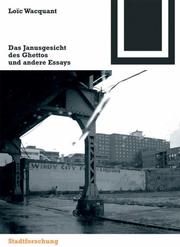
ISBN: 3764379634 3764374616 Year: 2006 Publisher: Basel : Birkhauser,
Abstract | Keywords | Export | Availability | Bookmark
 Loading...
Loading...Choose an application
- Reference Manager
- EndNote
- RefWorks (Direct export to RefWorks)
Die hier versammelten Essays gelten dem Zusammenhang von sozialer und ethnischer Ausgrenzung und staatlicher Politik in den Metropolen zu Beginn des 21. Jahrhunderts. Die aus einer erfahrungsgestützten Perspektive geschriebenen Beiträge diagnostizieren die sich überall abzeichnenden Formen städtischer Armut und Gewalt in den entwickelten Gesellschaften des reichen Westens. Der Autor arbeitet mit einem soziologischen Konzept des Ghettos als Instrument ethnischer Kontrolle und Einschließung. Er zeigt, wie sich Staaten zunehmend von der Idee und der Praxis der sozialen Wohlfahrt trennen und zur Ausgrenzung der «sozial Abgehängten» übergehen. Essays in diesem Band sind unter anderem «Städtische Ausgrenzung im 21. Jahrhundert» und «Die Bestrafung der Armut und der Aufstieg des Neoliberalismus».
Inner cities. --- Sociology, Urban. --- Urban sociology --- Cities and towns --- Central cities --- Ghettos, Inner city --- Inner city ghettos --- Inner city problems --- Zones of transitions --- Urban cores
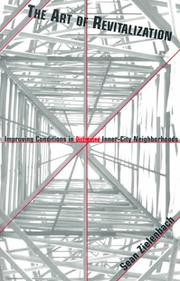
ISBN: 0815335989 9780203904251 0203904257 0203904265 9780203904268 9780815335979 0815335970 9780815335986 0815335970 9786610407330 6610407339 1135577455 9781135577452 1280407336 9781280407338 9781135577407 9781135577445 1135577447 Year: 2000 Publisher: New York : Garland,
Abstract | Keywords | Export | Availability | Bookmark
 Loading...
Loading...Choose an application
- Reference Manager
- EndNote
- RefWorks (Direct export to RefWorks)
This book discusses the revitalization of decayed inner-city neighborhoods. It explores the role of social capital in stabilizing and turning around distressed communities, and it highlights the roles that local actors can and do play in the revitalization process.The Art of Revitalization takes two Chicago neighborhoods, Englewood and North Lawndale, as case studies. Zielenbach discusses them in the context of racial change and urban decay in Chicago since World War II. The account of the changing neighborhoods is fascinating and clear, and the strength of the author's portray
Urban renewal --- Community development, Urban --- Inner cities --- Central cities --- Ghettos, Inner city --- Inner city ghettos --- Inner city problems --- Zones of transitions --- Cities and towns --- Urban cores --- Community programs, Urban --- Neighborhood improvement programs --- Urban community development --- Urban economic development --- City planning --- Sociology, Urban --- Urban policy --- Citizen participation --- Government policy --- Social aspects --- RENOUVEAU URBAIN --- U.S.A. --- DEVELOPPEMENT COMMUNAUTAIRE URBAIN --- REVITALISATION --- GEOGRAPHIE HUMAINE --- ILLINOIS --- CHICAGO
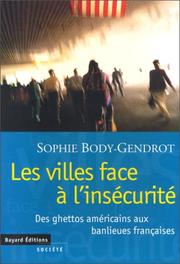
ISBN: 2227137703 9782227137707 Year: 1998 Publisher: Paris: Bayard,
Abstract | Keywords | Export | Availability | Bookmark
 Loading...
Loading...Choose an application
- Reference Manager
- EndNote
- RefWorks (Direct export to RefWorks)
Cities and towns --- Violence --- Urban policy --- Villes --- Politique urbaine --- -Cities and towns --- -Inner cities --- -Violence --- -343.9 <44> --- Global cities --- Municipalities --- Towns --- Urban areas --- Urban systems --- Human settlements --- Sociology, Urban --- Violent behavior --- Social psychology --- Central cities --- Ghettos, Inner city --- Inner city ghettos --- Inner city problems --- Zones of transitions --- Urban cores --- Prevention --- Criminalité --- Histoire --- Politique culturelle --- Politique de l'architecture --- Politique de l'urbanisme --- Politique sociale --- Sociologie urbaine --- Violence (thème) --- Chicago --- Marseille --- New york --- Strasbourg --- Inner cities --- 343.9 <44> --- Délinquance
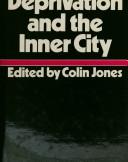
ISBN: 0856647136 9780856647130 Year: 1979 Publisher: London: Croom Helm,
Abstract | Keywords | Export | Availability | Bookmark
 Loading...
Loading...Choose an application
- Reference Manager
- EndNote
- RefWorks (Direct export to RefWorks)
Cities and towns --- Inner cities --- Villes --- Centres villes --- Great Britain --- Grande-Bretagne --- Social conditions --- Conditions sociales --- -Inner cities --- -Central cities --- Ghettos, Inner city --- Inner city ghettos --- Inner city problems --- Zones of transitions --- Urban cores --- Global cities --- Municipalities --- Towns --- Urban areas --- Urban systems --- Human settlements --- Sociology, Urban --- -Cities and towns --- -Great Britain --- Cities and towns - Great Britain --- Inner cities - Great Britain --- Great Britain - Social conditions - 1945
Book
ISBN: 1280491701 9786613586933 0820339741 9780820339740 9781280491702 6613586935 9780820338743 0820338745 0820364991 9780820364995 Year: 2011 Publisher: Athens, Georgia : University of Georgia Press,
Abstract | Keywords | Export | Availability | Bookmark
 Loading...
Loading...Choose an application
- Reference Manager
- EndNote
- RefWorks (Direct export to RefWorks)
This on-the-ground study of one square mile in Detroit was written in collaboration with neighborhood residents, many of whom were involved with the famous Detroit Geographical Expedition and Institute. Fitzgerald, at its core, is dedicated to understanding global phenomena through the intensive study of a small, local place. Beginning with an 1816 encounter between the Ojibwa population and the neighborhood's first surveyor, William Bunge examines the racialized imposition of local landscapes over the course of European American settlement. Historical events are firmly situated in space-a task Bunge accomplishes through liberal use of maps and frequent references to recognizable twentieth-century landmarks. More than a work of historical geography, Fitzgerald is a political intervention. By 1967 the neighborhood was mostly African American; Black Power was ascendant; and Detroit would experience a major riot. Immersed in the daily life of the area, Bunge encouraged residents to tell their stories and to think about local politics in spatial terms. His desire to undertake a different sort of geography led him to create a work that was nothing like a typical work of social science. The jumble of text, maps, and images makes it a particularly urgent book-a major theoretical contribution to urban geography that is also a startling evocation of street-level Detroit during a turbulent era. A Sarah Mills Hodge Fund Publication
Social justice --- Social change --- Human geography --- Inner cities --- African Americans --- Equality --- Justice --- Change, Social --- Cultural change --- Cultural transformation --- Societal change --- Socio-cultural change --- Social history --- Social evolution --- Anthropo-geography --- Anthropogeography --- Geographical distribution of humans --- Social geography --- Anthropology --- Geography --- Human ecology --- Central cities --- Ghettos, Inner city --- Inner city ghettos --- Inner city problems --- Zones of transitions --- Cities and towns --- Urban cores --- Afro-Americans --- Black Americans --- Colored people (United States) --- Negroes --- Africans --- Ethnology --- Blacks --- History. --- Social conditions. --- Detroit (Mich.) --- Fitzgerald (Detroit, Mich.) --- Fitzgerald, Detroit --- Detroit --- Diṭroiṭ (Mich.) --- Deṭroyṭ (Mich.) --- Town of Detroit (Mich.) --- City of Detroit (Mich.) --- Geography. --- Race relations. --- Noirs Américains --- Conditions sociales --- Black people
Book
ISBN: 9781849645881 1849645884 9780745331140 0745331149 9780745331133 0745331130 Year: 2011 Publisher: New York : Pluto Press,
Abstract | Keywords | Export | Availability | Bookmark
 Loading...
Loading...Choose an application
- Reference Manager
- EndNote
- RefWorks (Direct export to RefWorks)
The West has become obsessed with Muslims, constantly classifying them as either 'moderate' or 'extreme'. Reacting against this dehumanising tendency, Jeremy Seabrook and Imran Ahmed Siddiqui show us the daily life of poor Muslims in India and sheds light on what lies behind India's 'economic miracle'. The authors examine life in Muslim communities in Kolkata, home to some of the most disadvantaged people in India, giving a voice to their views, values and feelings. We see that Muslims are no different from those of other faiths - work, family and survival are the overwhelming preoccupations of the vast majority. Although most are observant in their religion, there is no trace of the malevolence or poverty-fuelled extremism attributed to them. This enlightening and elegantly written book will be of great interest to students and practitioners of development and anyone who wants a more realistic picture of Muslim life and modern India.
Muslims --- Poor --- Poverty --- Inner cities --- Regions & Countries - Asia & the Middle East --- History & Archaeology --- South Asia --- Central cities --- Ghettos, Inner city --- Inner city ghettos --- Inner city problems --- Zones of transitions --- Cities and towns --- Urban cores --- Destitution --- Wealth --- Basic needs --- Begging --- Subsistence economy --- Disadvantaged, Economically --- Economically disadvantaged --- Impoverished people --- Low-income people --- Pauperism --- Poor, The --- Poor people --- Persons --- Social classes --- Mohammedans --- Moors (People) --- Moslems --- Muhammadans --- Musalmans --- Mussalmans --- Mussulmans --- Mussulmen --- Religious adherents --- Islam --- Economic conditions --- Social conditions --- Economic conditions. --- Social conditions. --- Urban poor --- Calcutta (India) --- Ghetto. --- Muslim. --- Religiöse Minderheit. --- Indien. --- Social life and customs.
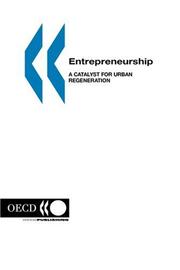
ISBN: 9789264017320 1280173564 9786610173563 9264017321 9264017313 Year: 2004 Publisher: Paris : OECD,
Abstract | Keywords | Export | Availability | Bookmark
 Loading...
Loading...Choose an application
- Reference Manager
- EndNote
- RefWorks (Direct export to RefWorks)
This book presents a 'toolbox' of instruments for entrepreneurship development in what often appear to be the most hostile environments for economic development in our cities, showing how entrepreneurship can indeed prosper given the right stimulus. It is based on the proceedings of the conference on Entrepreneurship and Economic Development in Distressed Urban Areas held 7-8 October 2003 in Rome, and organised by the OECD LEED Programme, in collaboration with the EU, the municipality of Rome, and Risorse per Roma.
New business enterprises --- Entrepreneurship --- Inner cities --- Business incubators. --- Business hatcheries --- Experimental innovation centers (Business) --- Hatcheries, Business --- Incubator industrial parks --- Incubator space (Business) --- Incubators (Entrepreneurship) --- New business incubators --- Industrial districts --- Central cities --- Ghettos, Inner city --- Inner city ghettos --- Inner city problems --- Zones of transitions --- Cities and towns --- Urban cores --- Entrepreneur --- Intrapreneur --- Capitalism --- Business incubators --- Business starts --- Development stage enterprises --- How to start a business --- New companies --- Start-up business enterprises --- Start-up companies --- Start-ups (Business enterprises) --- Starting a business --- Startups (Business enterprises) --- Business enterprises
Periodical
ISSN: 00420972 15731960 Year: 1966 Publisher: New York : Springer Science+Business Media B.V.
Abstract | Keywords | Export | Availability | Bookmark
 Loading...
Loading...Choose an application
- Reference Manager
- EndNote
- RefWorks (Direct export to RefWorks)
Education, Urban --- Enseignement en milieu urbain --- Periodicals. --- Périodiques --- Education, Urban. --- Arts and Humanities --- Education & Careers --- General and Others --- Society and Culture --- Urban Education. --- Inner city education --- Urban education --- Cities and towns --- Urban policy
Periodical
Abstract | Keywords | Export | Availability | Bookmark
 Loading...
Loading...Choose an application
- Reference Manager
- EndNote
- RefWorks (Direct export to RefWorks)
Education, Urban --- Enseignement en milieu urbain --- Education, Urban. --- Éducation. --- Milieu urbain. --- Politique éducative. --- Société --- Sociologie de l'éducation. --- États-Unis. --- Inner city education --- Urban education --- Cities and towns --- Urban policy
Periodical
Abstract | Keywords | Export | Availability | Bookmark
 Loading...
Loading...Choose an application
- Reference Manager
- EndNote
- RefWorks (Direct export to RefWorks)
Education, Urban --- Enseignement en milieu urbain --- Education, Urban. --- Éducation. --- Milieu urbain. --- Inner city education --- Urban education --- Cities and towns --- Urban policy --- Arts and Humanities. --- Education & Careers --- General and Others. --- Arts and Humanities --- General and Others --- Educational sciences
| Listing 1 - 10 of 35 | << page >> |
Sort by
|

 Search
Search Feedback
Feedback About UniCat
About UniCat  Help
Help News
News